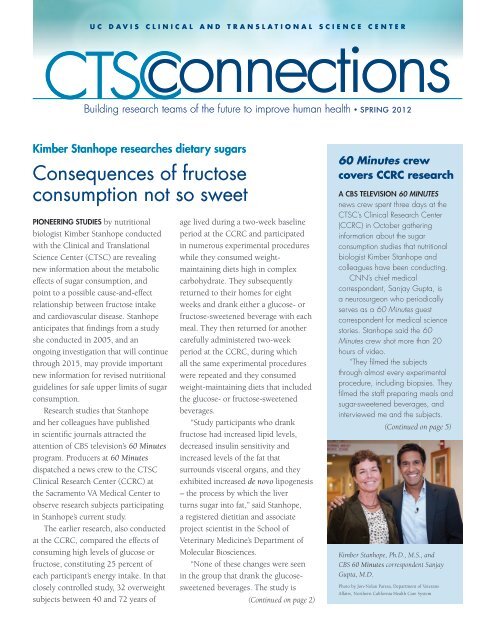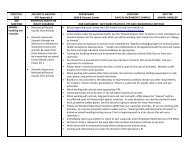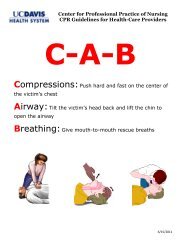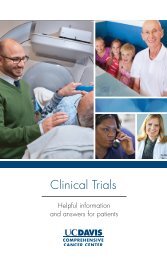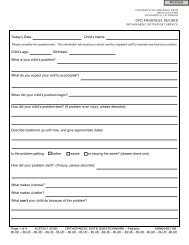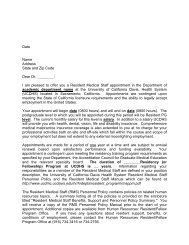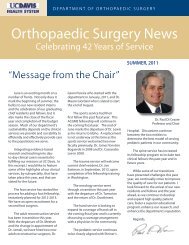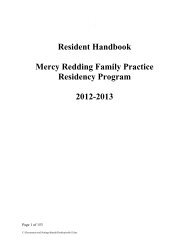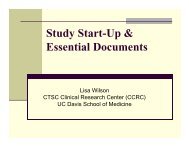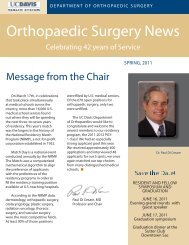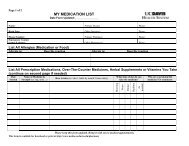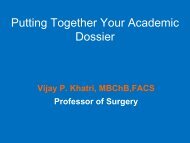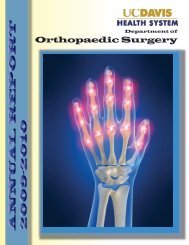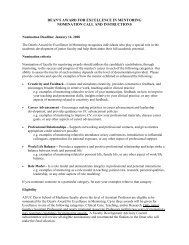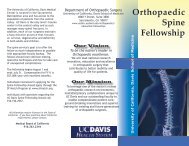Consequences of fructose consumption not so sweet - UC Davis ...
Consequences of fructose consumption not so sweet - UC Davis ...
Consequences of fructose consumption not so sweet - UC Davis ...
You also want an ePaper? Increase the reach of your titles
YUMPU automatically turns print PDFs into web optimized ePapers that Google loves.
FructoseContinued from page 1important because it shows very clearmetabolic differences between glucoseand <strong>fructose</strong>. That difference had <strong>not</strong>been well documented in humans untilthis study,” Stanhope added.The current study, even moreambitious, encompasses 200 subjectsaged 18 to 40, who range from normalweight to overweight. Participants areorganized into eight research studygroups to compare the effects <strong>of</strong>commonly consumed sugars – high<strong>fructose</strong>corn syrup (HFCS) and sucrose– with those <strong>of</strong> glucose and <strong>fructose</strong>.Participants each begin with threedays <strong>of</strong> baseline study at the CCRC,followed by a 12-day outpatient periodand conclude with a return visit to theCCRC. Even though the study is stillunder way, initial results were publishedin the Journal <strong>of</strong> Clinical Endocrinologyand Metabolism in October 2011.“Early results from the first 48subjects showed very clearly thatbeverages <strong>sweet</strong>ened with high-<strong>fructose</strong>corn syrup increased lipids – riskfactors for cardiovascular disease –comparably to <strong>fructose</strong> and significantlymore than glucose does. That isimportant because these results – evenmore directly than our first study –suggest that the as<strong>so</strong>ciation betweenhigh-sugar diets and cardiovasculardisease may specifically be due to causeand effect,” Stanhope said. “Two weeksafter giving the subjects high-<strong>fructose</strong>corn syrup, we saw an increase in therisk factors for cardiovascular disease,specifically LDL cholesterol andapolipoprotein-B.”Stanhope’s collaborators on thesestudies include principal investigatorPeter Havel, a <strong>UC</strong> <strong>Davis</strong> pr<strong>of</strong>es<strong>so</strong>r <strong>of</strong>molecular biosciences and nutrition;Nancy Keim at the USDA WesternHuman Nutrition Research Center;and Lars Berglund, John McGahanand Valentina Medici <strong>of</strong> the <strong>UC</strong> <strong>Davis</strong>School <strong>of</strong> Medicine.Throughout the studies, CCRC’sresearch nursing team managed allsubject care activity and implementedthe protocol.“Our nurses assessed eligibility,collected and processed more than200 blood specimens for serialblood sampling, conducted oralglucose tolerance tests and heparintrials, collected and processed urinesamples, dispensed study beverages a<strong>so</strong>utlined in the protocol, and ensuredsafety and protocol adherence,” saidregistered nurse and CCRC As<strong>so</strong>ciateDirector Nicole Mullen. The CCRC’snurse practitioner prepared drafts <strong>of</strong>physician orders and nursing flowsheets that mirrored the IRB-approvedprotocol; gathered medical historiesfrom subjects and conducted physicalexams; conveyed information to studyphysicians; and performed the glutealadipose tissue biopsies.“Our exercise physiologistconducted DEXA scans, measuredtotal body water using a bioimpedancespectroscopy device, conductedmetabolic testing, and compileddata for the principal investigatormonthly,” Mullen added. Further,the CCRC’s dietitian supervised mealpreparation and trained the study staffin food-handling safety and labelingregulations.Stanhope credits the CTSC staff andthe CCRC facilities for contributing tothe success <strong>of</strong> her studies.“The rea<strong>so</strong>ns we were able to showthe differences <strong>so</strong> clearly are partlyrelated to how carefully the study wascontrolled using the CCRC facilities,”Stanhope said. She is preparing grantproposals for two more studies that sheplans to al<strong>so</strong> conduct at the CCRC.The project described is supportedby the National Center for ResearchRe<strong>so</strong>urces through grant #UL1RR024146and the National Center for AdvancingTranslational Sciences, National Institutes<strong>of</strong> Health.Kimber Stanhope is scheduled to presenta seminar titled “Are <strong>fructose</strong>-containingsugars (HFCS and sucrose) contributing tothe epidemic <strong>of</strong> metabolic syndrome?”at the CTSC on April 26 at noon.2 <strong>UC</strong> <strong>Davis</strong> Clinical and Translational Science Center • Spring 2012
DIRECTOR’S MESSAGE<strong>UC</strong> BRAID program fuels researchLars Berglund, M.D., Ph.D.“By sharing experiencesand ideas, leaders fromthe medical centers areseeking <strong>UC</strong>-wide <strong>so</strong>lutions toadvance the potential beyondwhat any single center canaccomplish alone.”THE <strong>UC</strong> OFFICE OF THE PRESIDENTand Clinical and Translational ScienceAwards programs have launched anew initiative to fuel collaborativeresearch. Known as <strong>UC</strong> BiomedicalResearch Acceleration, Integrationand Development (<strong>UC</strong> BRAID), theprogram aims to harness and focusresearch in California, acceleratingacademic partnerships to benefithuman health.<strong>UC</strong> BRAID al<strong>so</strong> aims to stimulateideas that challenge the status quoand overcome the phalanx <strong>of</strong> barriersthat limit biomedical research. Forexample, investigators face everchangingregulatory requirements andobstacles in their ability to advanceresearch that improves health whilemaintaining the highest level <strong>of</strong>patient safety and privacy. Our aim isto help investigators overcome thesedifficulties through an improvedorganizational infrastructure that issupportive while respecting the needfor compliance.By sharing experiences and ideas,leaders from the medical centersare seeking <strong>UC</strong>-wide <strong>so</strong>lutions toadvance the potential beyond whatany single center can accomplishalone. To date, <strong>UC</strong> BRAID hasestablished working groups toaddress methods to streamlinecontracting practices, IRB review,informatics, drug discovery anddevelopment, and metrics to defineprocesses and outcomes <strong>of</strong> theprogram. Visit www.ucbraid.org/ formore information.FEATURED SCHOLARNephrologist Lorien DalrympleINFECTIONS THAT COMMONLYAFFLICT DIALYSIS PATIENTS may al<strong>so</strong>substantially increase their risk <strong>of</strong>cardiovascular problems, according toresearch conducted by nephrologistLorien Dalrymple. Funded with aK12 grant from the CTSC, Dalrympleis investigating the types, rates andrisk factors for infection and theas<strong>so</strong>ciated cardiovascular consequences<strong>of</strong> infection in patients with chronickidney disease (CKD) on dialysis.“I became interested inunderstanding the epidemiologyand consequences <strong>of</strong> infections inpatients with CKD because infectionand cardiovascular disease are leadingcauses <strong>of</strong> hospitalizations and death inthis population,” said Dalrymple, whoattributes her research career trajectoryto CTSC support.“Numerous CTSC re<strong>so</strong>urces havebeen fundamental to my success as aresearcher,” Dalrymple said. “CTSC<strong>of</strong>fers career development awards,mentorship, grant-writing support, andopportunities to present research andobtain directed feedback from peersat a critically important time, early incareer development.”Dalrymple’s work has impressedRichard L. Kravitz, as<strong>so</strong>ciate director <strong>of</strong>the K12 Training Program in the CTSC.“Dr. Dalrymple is a terrificexemplar <strong>of</strong> a young, translationalclinician-investigator. Her work oninflammation, infection and heartLorien Dalrymple, M.D., M.P.H.disease in patients with CKD addressescritical problems at the margins <strong>of</strong>nephrology, cardiology, infectiousdisease and implementation science,”said Kravitz, who is al<strong>so</strong> co-vice chair <strong>of</strong>research, and pr<strong>of</strong>es<strong>so</strong>r in the Department<strong>of</strong> Internal Medicine. “She recentlyreceived a very good score from NIHfor an extramurally supported K-award.We hope this award will propel her t<strong>of</strong>urther success.”<strong>UC</strong> <strong>Davis</strong> Clinical and Translational Science Center • Spring 20123
Linda Ziegahn, communityengagement manager at the CTSC,helps identify the communitiesinterested in partnering with <strong>UC</strong> <strong>Davis</strong>researchers and introduces them to theresearchers who want to collaboratewith those communities as equalpartners focused on improving health.She hopes that the results <strong>of</strong> this pilotstudy will lead to larger studies andeventually to community interventionsthat will improve the overall health <strong>of</strong>African-American families.“In the future we would like tosee better access to fresh fruit andvegetables, schools assigning more time“By engaging those groupsunderserved by healthservices, we believe we arestarting in the right place.”~ Linda Ziegahn, CommunityEngagement Managerto physical education, and food banksrevising the type <strong>of</strong> food provided forlow-income families,” said Ziegahn.“By engaging those groups underservedby health services, we believe we arestarting in the right place.”In addition to this project,CTSC-funded community-engagedresearch studies al<strong>so</strong> will investigatepremature births and low birthweights in African Americans,and physical- and mental-healthconditions among Iraqi refugees.The project described is supportedby the National Center forResearch Re<strong>so</strong>urces through grant#UL1RR024146 and the NationalCenter for Advancing TranslationalSciences, National Institutes <strong>of</strong> Health.NEW APPOINTMENTTed Wun named as<strong>so</strong>ciate dean for researchTed Wun, chief <strong>of</strong> the Division <strong>of</strong>Hematology and Oncology, has beennamed as<strong>so</strong>ciate dean for research atthe <strong>UC</strong> <strong>Davis</strong> School <strong>of</strong> Medicine. Inhis new role, he will be responsiblefor working with Lars Berglund,senior as<strong>so</strong>ciate dean for research,in expanding the breadth and depth<strong>of</strong> research at the health system,as well as implementing the healthsystem’s 2011–2016 Strategic Plan toincrease high-impact, interdisciplinaryresearch. His duties al<strong>so</strong> will includecoordinating efforts in implementationscience throughout the health systemand serving as the health systemrepresentative to the As<strong>so</strong>ciation <strong>of</strong>Academic Health Centers.“I’ve had the privilege <strong>of</strong> workingwith Ted over the years, and he hascertainly proven his drive and dedicationto research,” said Berglund, who al<strong>so</strong>is program director <strong>of</strong> the Clinical andTranslational Science Center (CTSC). “Heis an excellent collaborator and will bringhis broad experience and perspective inshaping the future landscape <strong>of</strong> researchat the health system.”With this new appointment, Wunwill add to his roles as director <strong>of</strong> theCTSC Clinical Research Re<strong>so</strong>urces andFacilities program, chief <strong>of</strong> the Division <strong>of</strong>Hematology and Oncology at <strong>UC</strong> <strong>Davis</strong>,and chief <strong>of</strong> hematology oncology at VANorthern California Health Care System.Wun joined <strong>UC</strong> <strong>Davis</strong> Medical Centerin 1992 and is currently a pr<strong>of</strong>es<strong>so</strong>r <strong>of</strong>medicine in the Division <strong>of</strong> Hematologyand Oncology, as well as pr<strong>of</strong>es<strong>so</strong>r <strong>of</strong>pathology and laboratory medicine.Ted Wun, M.D.He graduated magna cum laudefrom Union College in Schenectady,N.Y., and from Albany MedicalCollege. He is board-certified ininternal medicine, hematology andmedical oncology.<strong>UC</strong> <strong>Davis</strong> Clinical and Translational Science Center • Spring 20127


